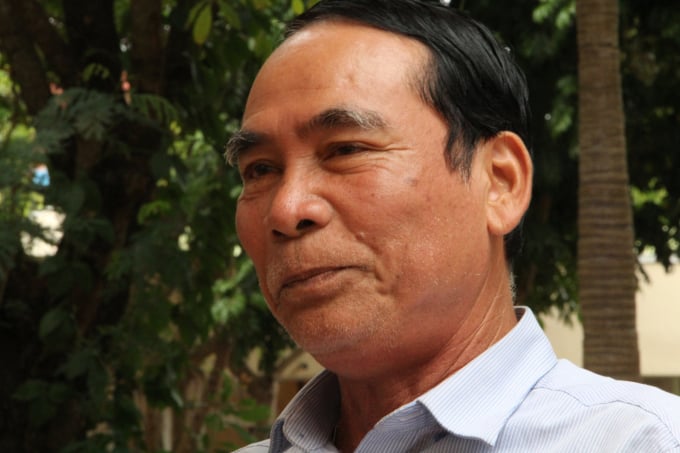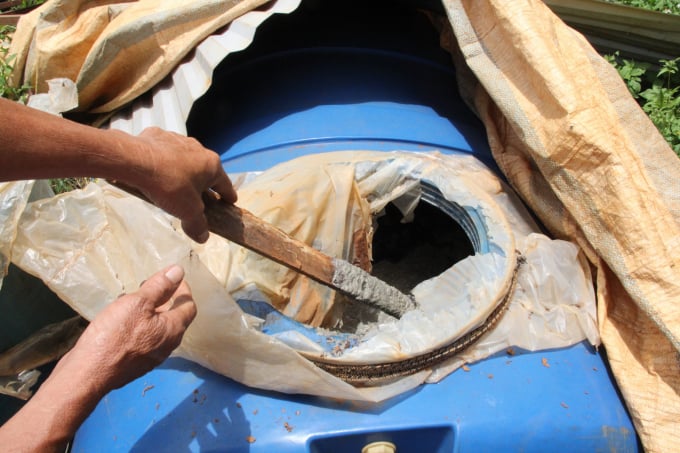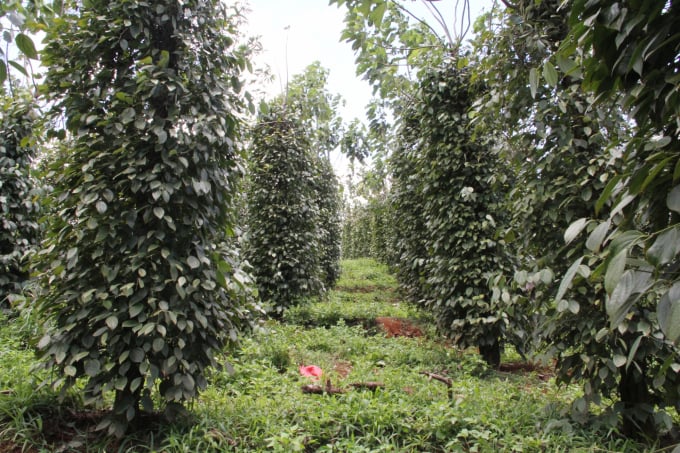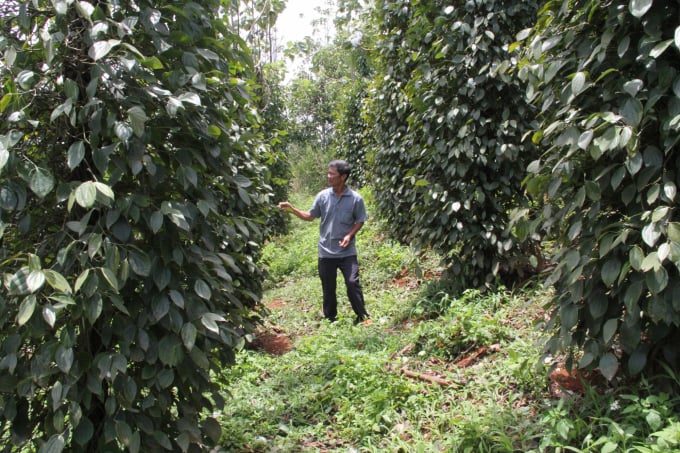June 16, 2025 | 22:42 GMT +7
June 16, 2025 | 22:42 GMT +7
Hotline: 0913.378.918
June 16, 2025 | 22:42 GMT +7
Hotline: 0913.378.918

Mr. Dang Tan Huynh, Director of Dong Thuan Organic Pepper Cooperative. Photo: Minh Quy.
Many years ago, many famous pepper lands in the Central Highlands fell into dire straits. Pepper prices went up and down uncontrollably, and crops constantly became ill and died. Once making a fortune thanks to pepper, many families have been pushed to the state of separation. They had to sell all their houses and farms and leave their homeland.
The situation seems helpless and frustrated even now, but not necessarily without any way out. The “pepper capital” still has gardens that are immune to diseases, and there are still farmers who leisurely sell pepper at high prices despite market fluctuations. They are the organic pepper growers, and although with a very modest rate, they will be the savior that revives the pepper plant in the Central Highlands.
Not only in Nhan Co commune (the pepper capital of Dak R'lap district, Dak Nong province), but the whole pepper growing community in the Central Highlands has known of this man: Mr. Dang Tan Huynh - the earliest organic pepper grower in the Central Highlands.
For a long time, the name "Mr. Huynh organic pepper" has become extremely familiar in the pepper growing community on this plateau.

Using fish as nitrogen fertilizers for pepper. Photo: Minh Quy.
When he first went to the Central Highlands with the desire to change people’s mindset about farming, he thought that this rich and fertile land would be easy to perform clean, zero-chemicals agriculture.
But he was wrong. He talked a lot, and no one listened.
There were meetings of cooperative members where he tried to make them understand that the indiscriminate use of chemical herbicides and pesticides would of course push the grass and insects to their death, but so would the people. Hearing that, many people stood up right away, cursed at him, and went home.
The situation lasted for decades, and the consequences eventually came. Chemical fertilizers and pesticides abuse caused the land, the crops, and the living environment to experience drastic changes. It was then people realized that he was not a “villain”. Especially when the whole Nhan Co pepper suddenly turned yellow and died while only Mr. Huynh's lush pepper garden was collecting fruit normally did they believe him. “It turns out that chemical fertilizers and drugs are not miracle potions.”

Revitalizing pepper gardens in the Central Highlands through organic solutions. Photo: Minh Quy.
Now Mr. Dang Tan Huynh is the Director of Dong Thuan Organic Pepper Cooperative with 17 members and an area of approximately 80 ha. The area may seem a bit too little, but as Mr. Huynh said, together with Dak Song (Dak Nong) or Cu Kuin (Dak Lak), Chu Se (Gia Lai) and many other pepper regions in the Central Highlands, the organic pepper growing community is spreading and attracting many more farmers to participate.
“This is a work of returning the fertility to the land, giving back to the land what people have taken away for decades to survive. The good news is that the movement is spreading more and more widely and claim its position with certainty as a mandatory path towards sustainable pepper production.”
Thanks to this farming model, when Son Ha Spice & Flavorings Co., Ltd was looking for farmers to associate with organic pepper cultivation in 2014, a representative of Control Union Certifications took soil samples for testing, and the results matched absolute safety requirements. Through the path of production linkage, the pepper of Mr. Huynh and many other families in Nhan Co was quickly certified to meet US organic standards.

US-certified organic pepper gardens. Photo: Hoang Anh.
Ha Bach Tan, Pepper Project Manager of Son Ha Spice & Flavorings Co., Ltd, shared, “2014 is the time when basically the majority of pepper growers in the Central Highlands cannot yet imagine what organic is. It took us a lot of effort just to find four households that agreed to join the project.”
Mr. Mark Andew Barnett, Founder of Son Son Ha Spice & Flavorings Co., Ltd, despite roaming the Central Highlands many years ago to learn about raw materials, could not imagine the journey of associating organic pepper farming was that arduous. It was also Mr. Mark Andew Barnett who saw the problems and dangers of Central Highlands pepper right from the days the "spice queen" was at its highest glory.
“He always told us that if farmers continue to exploit the land and abuse fertilizers and pesticides so blatantly like, the consequences will surely come soon. The land and crops will degrade and be full of diseases, both the yield and quality will decline and the farmers themselves will be the ones to bear those consequences. You guys have to mobilize them to change at all costs," Mr. Ha Bach Tan recalled.
Around 2015 the soil in the pepper gardens of the four households began to show signs of recovery thanks to sufficient rest and compliance with the organic farming procedure, the neighboring pepper gardens were degraded beyond imagination.
Central Highlands pepper growers had no choice but to change. From the initial 4 households to 18, then 60, up to now the Central Highlands has had approximately 150 farmers and 300 ha of organic pepper cultivation directly associated with Son Ha, not to mention thousands of other satellite households with a total area of up to several thousand ha.
The conversion process takes three years and undergoes rigorous testing from Control Union Certifications. When meeting the standards, each household is granted a Certificate of Eco-Farmer. The enterprise will purchase all products, with a bonus of 25 - 30% compared to the market price.
“Regarding our development strategy, by 2025 organic pepper cooperative alliances will be formed with the organic pepper community of thousands of associated households. If the linkage between farmers, cooperatives and businesses is organized methodically, the worries about the price, output, and quality of pepper in the Central Highlands will certainly disappear. The pepper growing land of the Central Highlands will definitely revive," said Mr. Ha Bach Tan.
Translated by Samuel Pham
![Turning wind and rain into action: [4] Bringing climate bulletins to remote and isolated areas](https://t.ex-cdn.com/nongnghiepmoitruong.vn/608w/files/linhnhp/2025/06/14/1152-z6704423696987_15fd32ffc26d590d204d520c9dac6786-nongnghiep-151141.jpg)
(VAN) The Vietnam Agriculture and Nature Newspaper interviewed Mr. Vu Thai Truong, Acting Head of Climate Change and Environment at UNDP Vietnam, to gain deeper insight into how climate bulletins are delivered to farmers.

(VAN) In Tien Giang, a high-tech shrimp farm has developed a distinctive energy-saving farming model that has yielded promising results.
![Turning wind and rain into action: [3] 300.000 farmers benefit from agro-climatic bulletins](https://t.ex-cdn.com/nongnghiepmoitruong.vn/608w/files/news/2025/06/12/e5a48259d6a262fc3bb3-nongnghiep-125122.jpg)
(VAN) The agro-climatic bulletin has become a valuable tool for farmers in the Mekong Delta. After more than five years of implementation, the initiative is gradually being expanded nationwide.
![Turning wind and rain into action: [2] Providing forecasts to the people](https://t.ex-cdn.com/nongnghiepmoitruong.vn/608w/files/news/2025/06/12/e5a48259d6a262fc3bb3-nongnghiep-103927.jpg)
(VAN) In addition to improving the quality of hydrometeorological forecasts, putting forecast bulletins into practical use is crucial for production and disaster prevention.

(VAN) Blue carbon is receiving attention for its rapid absorption capacity and vast potential. It represents a promising nature-based solution to respond to climate change.
/2025/06/11/3507-1-161904_583.jpg)
(VAN) Seagrass beds and coral reefs serve as 'cradles' that nurture life in the ocean depths, creating rich aquatic resources in Vietnamese waters.
![Turning wind and rain into action: [1] Forecasting for farmers](https://t.ex-cdn.com/nongnghiepmoitruong.vn/608w/files/news/2025/06/11/e5a48259d6a262fc3bb3-nongnghiep-111919.jpg)
(VAN) Weather is no longer just a matter of fate. Forecasts have now become an essential companion for farmers in every crop season.